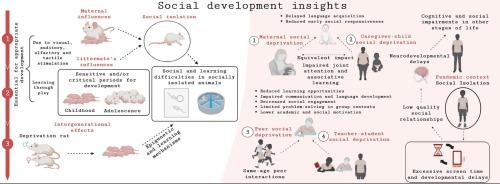从过去到未来:早期社会剥夺对编程学习和行为发展的影响
IF 2.6
4区 医学
Q3 NEUROSCIENCES
引用次数: 0
摘要
生命早期是哺乳动物健康发育的关键时期,在此期间,社会交往起着核心作用,对获得适应技能至关重要。相反,孕产妇剥夺和社会孤立等不良经历会对认知和社会情感能力产生长期的、潜在的不可逆转的影响。本研究调查了儿童和青少年早期社会剥夺对学习、语言和社交技能的影响,并分为两部分:啮齿动物模型的系统回顾和人类临床研究的叙述性回顾。在第一阶段,确定了12,378件物品,其中55件符合资格标准。研究结果表明,母性剥夺损害了啮齿动物的空间学习、歧视和亲社会行为,同时增加了类焦虑行为和攻击行为。当剥夺涉及到与同伴的完全社会隔离时,这些影响会加剧,并可能持续几代人。在第二阶段,临床研究证实,早期的社会剥夺损害了认知发展,导致语言习得延迟,破坏了社会功能。保护性因素,如稳定的照料和后来的社会重新融合,似乎减轻了这些结果中的一些。研究结果强调了早期社会剥夺对大脑发育和行为的深远影响,强调了预防和康复干预的必要性。本文章由计算机程序翻译,如有差异,请以英文原文为准。

From the past to the future: The influence of early social deprivation on learning and behavioral development through programming
Early life is a critical period for healthy development in mammals, during which social contact plays a central role, being crucial for acquiring adaptive skills. Conversely, adverse experiences such as maternal deprivation and social isolation can produce long-lasting and potentially irreversible effects on cognitive and socioemotional abilities. This study investigated the impact of early social deprivation during childhood and adolescence on learning, language, and social skills, and is divided into two parts: a systematic review of rodent models and a narrative review of clinical studies in humans. In phase one, 12,378 articles were identified, of which 55 were included by the eligibility criteria. The findings indicate that maternal deprivation in rodents impairs spatial learning, discrimination, and prosocial behaviors, while increasing anxiety-like behavior and aggression. These effects are exacerbated when deprivation involves complete social isolation from littermates and may persist across generations. In phase two, clinical studies confirm that early social deprivation compromises cognitive development and causes delays in language acquisition and disrupts social functioning. Protective factors, such as stable caregiving and later social reintegration, appear to mitigate some of these outcomes. The findings underscore the profound impact of early social deprivation on brain development and behavior, highlighting the need for preventive and rehabilitative interventions.
求助全文
通过发布文献求助,成功后即可免费获取论文全文。
去求助
来源期刊

Brain Research
医学-神经科学
CiteScore
5.90
自引率
3.40%
发文量
268
审稿时长
47 days
期刊介绍:
An international multidisciplinary journal devoted to fundamental research in the brain sciences.
Brain Research publishes papers reporting interdisciplinary investigations of nervous system structure and function that are of general interest to the international community of neuroscientists. As is evident from the journals name, its scope is broad, ranging from cellular and molecular studies through systems neuroscience, cognition and disease. Invited reviews are also published; suggestions for and inquiries about potential reviews are welcomed.
With the appearance of the final issue of the 2011 subscription, Vol. 67/1-2 (24 June 2011), Brain Research Reviews has ceased publication as a distinct journal separate from Brain Research. Review articles accepted for Brain Research are now published in that journal.
 求助内容:
求助内容: 应助结果提醒方式:
应助结果提醒方式:


